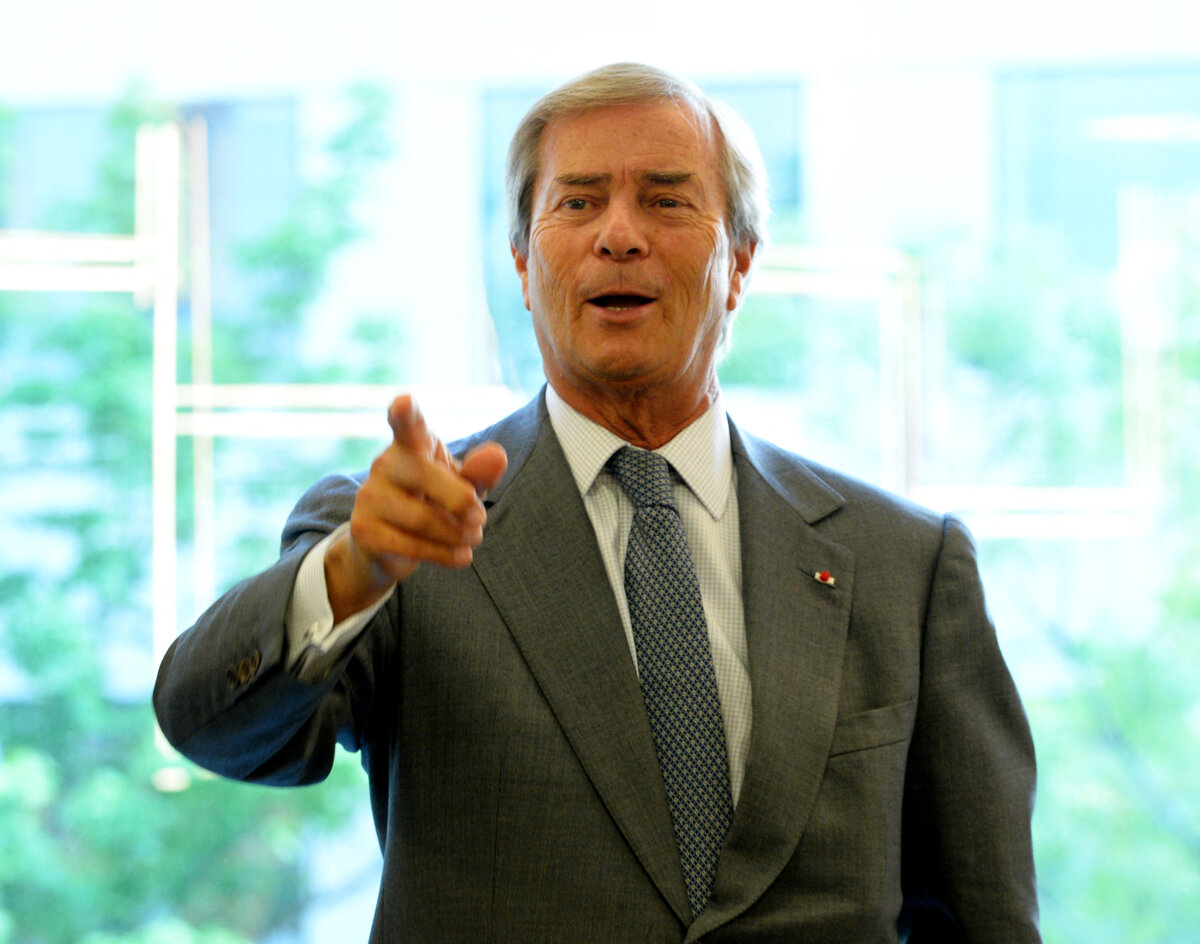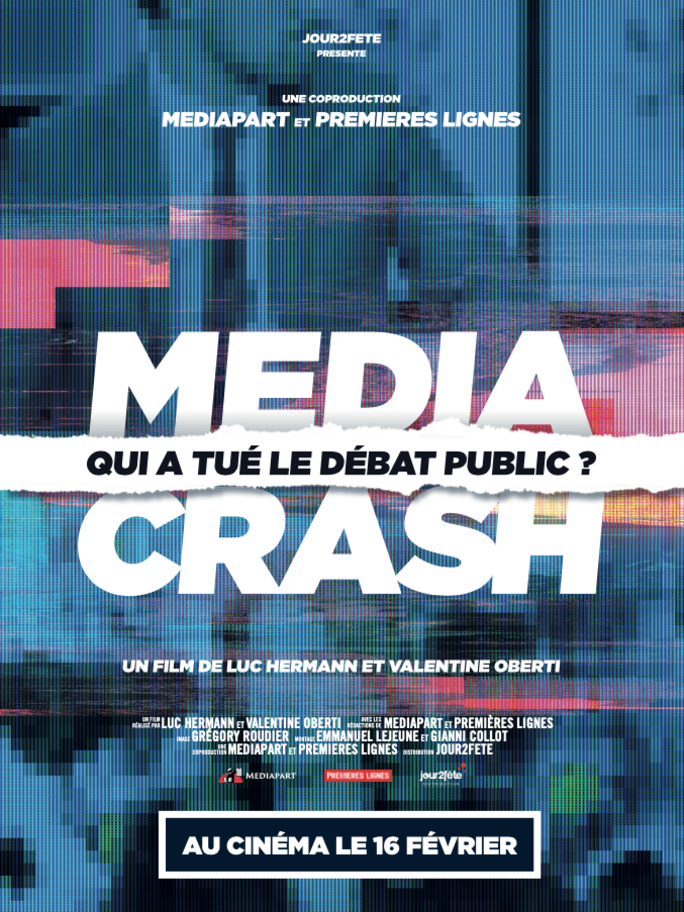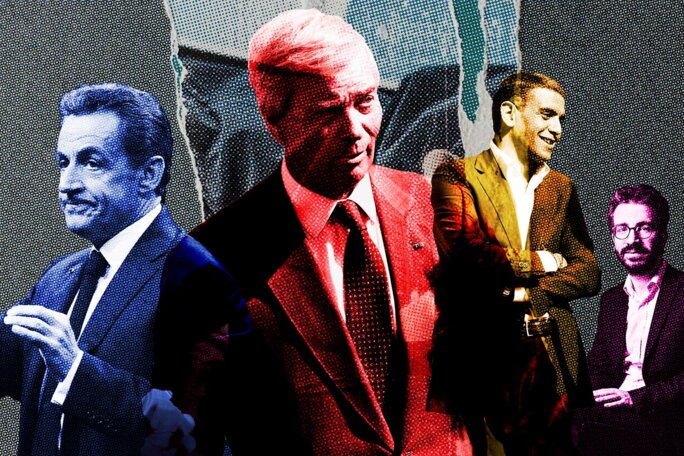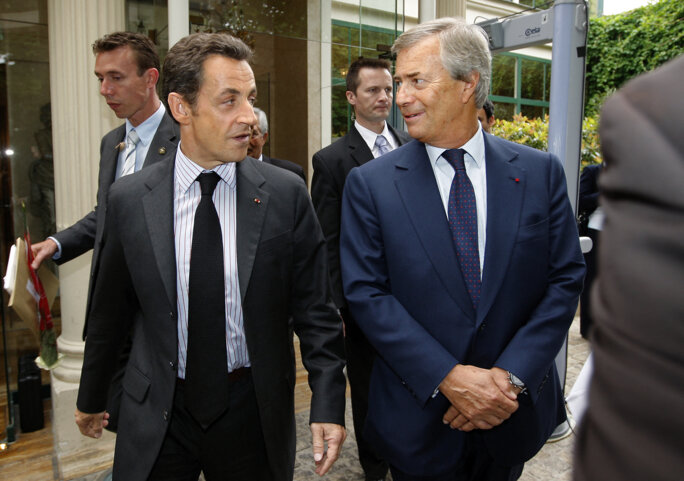It was at around 6am on the morning of April 8th 2016 when officers from the specialist anti-corruption branch of the French police, OCLCIFF, arrived with a search warrant at the home of businessman Vincent Bolloré, situated in the plush and private ‘Villa Montmorency’ residential park in western Paris. At the same time that morning, other officers turned up to search offices at the headquarters of the billionaire’s Bolloré group, located in the nearby suburb of Puteaux.
The raids were part of a judicial investigation opened four years earlier into the alleged corruption of two African presidents, Togo’s Faure Gnassingbé and Guinea’s Alpha Condé, in exchange for extending the businessman's concessions for the ports of, respectively, Lomé and Conakry.
That investigation would eventually lead, in February 2021, to plea bargaining by Bolloré, his group and two of its senior executives, who all admitted to the corruption.
The port management activity in West Africa, under the umbrella of its subsidiary Bolloré Logistics Africa, alongside railway concessions and road transport, was until recently one of the Bolloré conglomerate’s principal interests, in parallel with its continuing expansion into publishing, PR communications and the media – it notably owns TV channels Canal+, CNews and C8 and radio station Europe 1).
On the evening of April 7th 2016, the day before the police raids, French public TV channel France 2 broadcast an unflattering portrait of Vincent Bolloré and his group’s activities by the channel’s flagship current affairs programme ‘Complément d’enquête’.
One of those interviewed for the programme was Ange Mancini, a former prefect and high-ranking French police official, who since his retirement in 2013 worked for Bolloré as a special advisor. Mancini recounted how Bolloré privately described his family-owned group as resembling a gypsy camp. “Like in every gypsy camp,” Mancini said, “there is the king of the gypsies, and everyone knows who he is.”
While Bolloré had been shadowing the preparation of the France 2 documentary (available online, in French, here), the unexpected police raids, just hours later, shook him, as notably revealed by a phone conversation, tapped by police, between the billionaire and his close friend, former French president Nicolas Sarkozy. “I was unsettled because, you know, when it happens to you for the first time, it’s not very nice,” Bolloré told Sarkozy.

Enlargement : Illustration 1

The phone taps, carried out by police between March and July 2016, were ordered by Judge Serge Tournaire, the examining magistrate then in charge of the judicial investigation into the suspected corruption surrounding the African ports concessions.
The transcripts of the phone taps are revealed by Mediapart and TV production and news agency Premières Lignes as part of a joint documentary, 'Media Crash', a behind-the-scenes investigation into how a vast swathe of the French media is manipulated and gagged by a handful of wealthy proprietors – a concentration of private ownership never before seen in France – in the service of their own interests. 'Media Crash' will be released in theatres around the country beginning on February 16th (a list of venues and dates can be found here), and can be viewed by Mediapart's subscribers in a once-only showing on the website on February 15th.

Enlargement : Illustration 2

The transcripts show how Bolloré, 69, who was forewarned by high-flying French PR advisor Ramzi Khiroun about the contents of the ‘Complément d’enquête’ programme two days before it was broadcast, compared himself to the fictional Star Wars character Darth Vader, and recognised that press allegations against him were not only “completely true” but even “less than the reality”. They also reveal how Bolloré was secretly advised by Sarkozy on how to manage his PR communications.
In one conversation between the two men, the former French president referred to the scandal that erupted over Bolloré’s decision in July 2015, as owner of TV group Canal+, to shelve the broadcasting of a documentary about alleged tax evasion practices by a subsidiary of French bank Crédit Mutuel. It was, said Sarkozy, a “censorship about which everyone doesn’t give a damn”.
Neither Vincent Bolloré, who was contacted via his lawyer Olivier Baratelli, nor Nicolas Sarkozy, who was approached via his press attaché, responded to Mediapart’s requests for comment on the information contained in this report.
Vincent Bolloré, Ramzi Khiroun and a mysterious informer inside France Télévisions
On March 17th 2016, Bolloré received a phone call from Ramzi Khiroun, who once worked as head of PR for the since disgraced former head of the International Monetary Fund, Dominique Strauss-Kahn. Khiroun later joined the Lagardère media and publishing group (in which Vivendi, controlled by the Bolloré group, is now the major shareholder), as its director of external relations.
At the time, Bolloré had not yet become a shareholder in the Lagardère group, but the pair enjoyed close relations. Khiroun had also previously worked for the Euro RSCG advertising agency, a subsidiary of advertising and PR giant Havas – also now owned by Bolloré via Vivendi. He was a friend of two key individuals in Bolloré’s media activities: the veteran radio journalist Jean-Pierre Elkabbach and TV show presenter Cyril Hanouna. The French edition of Vanity Fair magazine reported how, when Elkabbach and Khiroun were awarded the Légion d’honneur in November 2015, Bolloré was present for the ceremony at the Élysée Palace, the French presidential office, to congratulate the two men.
Bolloré greeted Khiroun’s call that March 17th 2016 with a jocular, “Well, well, twice in the same day, it’s a celebration!”. Khiroun was calling about the ‘Complément d’enquête’ investigation into Bolloré’s activities, which was then three weeks away from transmission. He advised that the billionaire should have a phone conversation with the chief of staff for Delphine Ernotte, the president of the French public broadcasting group, France Télévisions, which controls the France 2 channel.
“Do you authorise me to give your mobile number to Stéphane Sitbon, in utmost secrecy, who is the director of the cabinet of Delphine Ernotte?” asked Khiroun, who added: “You tell him exactly what you think can be troublesome in what is being prepared, so that he can act in an effective manner. He will see what he can do […] He’s a nice guy, you’ll see.” Khiroun later explained that Sitbon “promises nothing” but that “in any case, he’ll see how he can look [at that]”.
Bolloré appeared ill at ease at the suggestion: “Yeah, but me, I haven’t seen the ‘Complément’ thingy [...] I don’t know. No, tell him no. It’s awkward, no?”
“Not at all,” replied Khiroun. “He’s my friend. Because we have very friendly relations […] and he’s also a good friend, so I have no difficulty, in fact, that you both talk together, because he’s very secret.”
Bolloré finally accepted that an approach should be made, but he preferred that Khiroun looked after the contact. “It’s for you to look into,” Bolloré told him. “Well, yes, you look into it. […] You’re an angel. Listen, firstly, you’re an angel to take it on […] It’s best that it’s you who takes a look.”
Once that had been settled, the conversation, recorded on transcripts in the case file, continued as follows:
Ramzi Khiroun:“Right then, so what could bother you then? […]
Vincent Bolloré (laughing): “Well, I don’t know! […] Firstly, I don’t know what bothers me, I know nothing, you see? They’re going to forever repeat the same things – Africa, thingy, Greenpeace stuff.”
Ramzi Khiroun: “OK [He] promises nothing. In any case he’ll see how he can look at it. There’s nothing false in all that [the accusations against Bolloré]?”
Vincent Bolloré: “Ah, but all that is completely true!
Ramzi Khiroun: (laughter)
Vincent Bolloré: “Wait – it’s even less than the reality” (laughter)
Ramzi Khiroun : “It’s the compilation that pisses you off?” (more laughter)
Vincent Bolloré: (the billionaire starts humming the Darth Vader theme from Star Wars)
Ramzi Khiroun (in a deep voice): “I am your father!”
Vincent Bolloré: “I am your father, absolutely. See what you can, but really, you’re an angel.”
Ramzi Khiroun: “OK. It’s ‘Complément d’enquête’, is it? That’s it?”
Vincent Bolloré: “Yes, ‘Complément d’enquête’ for [inaudible…]”
Ramzi Khiroun: “Understood, OK. There you go.”
Vincent Bolloré: “A big kiss, you’re adorable, thanks.”
Ramzi Khiroun: “See you, ciao!”

Enlargement : Illustration 3

Stéphane Sitbon, 34, first set out on a political career with the leftist wing of the Greens, as a senior aide for Cécile Duflot, a former secretary general of the EELV Green party alliance. He subsequently joined her ministerial staff when Duflot, who now heads Oxfam France, was appointed housing minister in 2012 after the election of socialist president François Hollande. After Duflot resigned her post in 2014 over government policy disagreements, Sitbon was appointed, in 2015, as chief of staff to Delphine Ernotte, the head of France Télévisions. In 2020, he was appointed as the group’s head of programming.
Within France Télévisions, Sitbon has a reputation for supporting investigative journalism, and notably for his role in the broadcasting, on the France 3 public channel in 2015, of the documentary about the Crédit Mutuel bank’s alleged tax evasion activities which had previously been censored and shelved by Bolloré at Canal+.
In his written replies to Mediapart’s questions, Sitbon said that it was because the Lagardère group was a major programme producer for France Télévisions that “I have known Ramzi Khiroun for several years, and I have had regular professional relations with him”. But he insisted: “On the opposite, I have never met, nor spoken with, Mr Vincent Bolloré. I have no recollection of having discussed with Ramzi Khiroun the subject of the ‘Complément d’enquête’ documentary nor about Vincent Bolloré, neither at the time nor afterwards.”
Meanwhile, Ramzi Khiroun confirmed Sitbon’s account. He told Mediapart: “The information you have according to which I intervened with France Télévisions in 2016 and was able to view, before it was broadcast, the portrait of Vincent Bolloré by ‘Complément d’enquête’ is quite simply false and without any basis.”
The phone taps show that Khiroun sent a mobile phone text message to Bolloré at precisely 12.56pm on April 5th 2016 – two days before the documentary was due to air – in which he wrote: “Confidential. A little summary by the person in charge of viewing [the documentary]. I’ll take a look a little later to check.”
The summary proved to be an exact description of what was in the programme, indicating that Khiroun had an informer within France Télévisions. “Nothing tense in the Bolloré,” reported Khiroun, citing the summary. “A sequence about the plantations in Cameroon with the blaming of the head of the plantation, not Bolloré directly. How he [Bolloré] tried to get one over [French industrialist Martin] Bouygues, how he got his hands on Havas. Lots of his friends talk. The clean-up at Canal. Major sequence on Guinea at the end. How Bolloré helps [now overthrown Guinean president] Alpha Condé with his re-election in order to develop [Bolloré’s interests] in the country. Kisses.”
In his written replies to Mediapart, Sitbon added: “I did not communicate the contents of the documentary, which, moreover, I watched after it was broadcast […] I gave no summary of it to absolutely no-one.”
While he was clearly well informed about the contents, Khiroun obtained no changes to the documentary. In 2017, it earned its makers, Tristan Waleckx and Matthieu Rénier, the prestigious Albert-Londres French-language journalism prize in the audio-visual category. Waleckx, who is now the presenter and co-editor of ‘Complément d’enquête’, told Mediapart that “as usual, no modification was made to the report”, and that he received “no request for a modification”.
“The report […] is the result of a journalistic investigation carried out in all independence, with no unusual exterior intervention,” added Waleckx. “And I am unaware of how Ramzi Khiroun had knowledge of its contents before it was broadcast.”
The programme so infuriated Vincent Bolloré that he embarked on an offensive of lawsuits against France Télévisions. One, lodged in both France and Cameroon, was for defamation, while another, for “denigration”, was lodged with the Paris commercial court, where he sought damages of 50 million euros.
Bolloré himself had no hesitation in defaming the journalists who made the documentary, falsely accusing them of having paid a 20-year-old Cameroon plantation worker to declare that he was a minor. But ‘Complément d’enquête’, in an update for the re-broadcasting of the documentary, was assured by the worker’s parents that he was 14-years-old, and had been paid the equivalent of 4 euros by Bolloré’s local partners in Cameroon to change, after the airing of the documentary, his earlier account and to declare before a huissier – a profession similar to that of a bailiff but with the added legal status of bearing witness to the signature of documents – that he was in fact an adult.
After five court cases (which Bolloré lost) over a period of three years, France Télévisions and Tristan Waleckx successfully fought off the two lawsuits launched by the billionaire, who was found to have used “abusive” legal action.
“I recall a very conflictual relationship between, Delphine Ernotte and Vincent Bolloré, which resulted in numerous legal procedures, because we have always supported the investigative work of our journalists, and notably that of Tristan Waleckx,” detailed Sitbon in his written replies to Mediapart. Waleckx confirmed this, telling Mediapart that “France Télévisions demonstrated independence, audacity and a certain courage in this editorial and legal battle launched by the Bolloré group”.
Bolloré to Sarkozy: “Thanks again, as always, for your advice.”
Back in April 2016, after the documentary was aired, and following the police raids on his home and offices just hours later, Vincent Bolloré turned to his friend Nicolas Sarkozy for advice. That friendship was made very public in 2007 when, immediately after Sarkozy’s election as president, Bolloré provided him with the use of his 60-metre yacht, the Paloma, on which the new French head of state relaxed with his family on a three-day cruise in the Mediterranean.
Immediately after the events that April, Bolloré felt the need to write a letter of self-justification to all the employees of his group. On April 18th 2016, Sarkozy, who had learnt of the planned move, phoned the billionaire from Los Angeles, where the former president was holidaying with his wife Carla Bruni.

Enlargement : Illustration 4

The transcripts of the tapped conversation show how Sarkozy tried to dissuade him from sending the letter:
Nicolas Sarkozy: “Have you already sent your letter, or not?”
Vincent Bolloré: “No, I stopped it because I wrote it in a moment […] of defence. I’ve stopped, absolutely, yes.”
Nicolas Sarkozy:” Ah, right. Because me, I had prepared for you a little […] note, where… I think, to tell you the truth, that you were giving far too much importance to that.”
Vincent Bolloré: “I think so, indeed, but at the time…[…] No-one has your force.”
Nicolas Sarkozy: “You know, I’m a specialist in all that.”
Vincent Bolloré: (Laughter)
Nicolas Sarkozy: “But come on, you’re not going to write to all your personnel, for the first time in fifteen years, because you have had two [police] raids at the port of Togo and that in Guinea. Come on, begging your pardon, excuse me!”
Bolloré, who it is apparent from the conversation had earlier sent Sarkozy the first text of the proposed letter, agreed: “I’ve had sent round to you, a little earlier, an amended text, which is now only for the Vivendi [general] assembly which takes place on Thursday [editor’s note, April 21st 2016], which has nothing to do with all that and which is positive and not defensive.”
Sarkozy replied: “That’s exactly what I prepared for you as a note, telling you, ‘listen, you’ve taken extremely important decisions, give them a briefing’.”
After Bolloré took control of Vivendi in 2015, he set about a brutal and intimidating campaign at the group’s subsidiary Canal+. This included axing the long-running and irreverent ‘Guignols de l'info’, a satirical puppet show, inspired in part by the British TV show Spitting Image, which lampooned politicians and celebrities. Bolloré also showed the door to most of the TV channel’s management, and censored the investigative documentary into tax evasion practices by the Crédit Mutuel bank.
In their April 18th 2016 phone conversation, Sarkozy told Bolloré: “You can’t write a letter just […] because you’re criticised in the press over the censorship about which everyone doesn’t give a damn, there’s no-one who believes it.”
“You’re right, once again,” replied Bolloré. “[…] Listen I won’t bother you in Los Angeles. I’ll be there in ten days. […] Give Carla a kiss and tell her that I hope America will be better than France. […] And also, if you have need of anything at all, I’m here. But thanks again, as always, for your advice.”
“You must be joking!” replied a bashful Sarkozy, who nevertheless asked if the police raids on Bolloré’s home and offices had affected his staff.
“No, in fact, not at all,” said Bolloré, laughing. “As for me, I was unsettled because, you know, when it happens to you for the first time, it’s not very nice […] But […] I had a meeting with my 150 top managers […] it was very pleasant and I had total support and so, in the event, I decided not to write to the Bolloré people. And concerning Vivendi-Canal, I’ve prepared a text of three pages which reproduces only the positive side, underlining the work that we do.”
Further into the conversation, Bolloré said of the police raids: “And you know, when you don’t know… that it’s the first time… you say to yourself always, you have a sort of syndrome…”
Sarkozy: “Ah, well, that, I know it!”
Bolloré: “It’s dreadful, it’s horrible, you see.”
Sarkozy: “I know that, I know that.”
In the end, it was only after he was formally placed under investigation for corruption in 2018 that Bolloré reacted publicly to the investigation targeting him, firstly in an opinion article published in the weekly, Le Journal du dimanche, which is owned by Lagardère (employer of Ramzi Khiroun), and subsequently in a letter he finally sent out to the employees of his group (which was revealed by the weekly Marianne). In that letter to staff, Bolloré denounced a “media hullabaloo” and a plot organised by “much more powerful interests”. He also attacked the approach of the magistrates investigating him: “The fable had been well prepared […] and the facts are twisted so that they fit into the preconceived décor.”
However, in February 2021, the Bolloré group admitted to practising corruption to secure its port concessions in Togo, and reached a plea-bargain deal with the public prosecution services to end the case against it by agreeing to pay a fine of 12 million euros.
Vincent Bolloré and two of his senior executives, the group's number two Gilles Alix and Havas's international director Jean-Philippe Dorent, also reached a plea-bargain deal with prosecutors, in which Bolloré was handed a fine of 375,000 for corruption. That would have brought an end to the judicial investigations, but the deal was overturned by a Paris court, also in February last year, which ruled that the three men should stand trial.
Under French law, until the case is tried in court, Bolloré legally benefits from a “presumption of innocence”.
-------------------------
If you have information of public interest you would like to pass on to Mediapart for investigation you can contact us at this email address: enquete@mediapart.fr. If you wish to send us documents for our scrutiny via our highly secure platform please go to https://www.frenchleaks.fr/ which is presented in both English and French.
-------------------------
- The original French version of this report can be found here.
English version by Graham Tearse


